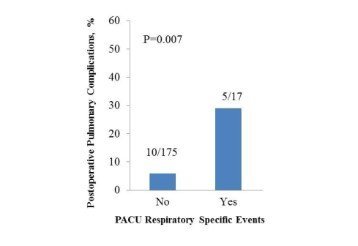
Pulmonary hypertension (PH) is a complex disease characterized by high blood pressure in the arteries of the lungs. Patients suffering from PH can have heart failure and trouble breathing. In general, patients with PH undergoing surgery are at higher risk of developing complications than surgical patients without PH. Most studies of these patients have focused on problems with the heart after surgery or complications following open-heart surgery. In our study we focused on problems that occur in the lungs, such as pneumonia, following surgeries other than heart surgery.
Furthermore, our results show that approximately 1 in 10 patients experienced severe lung complications following surgery. One quarter of these complications happened during anesthesia recovery, and three quarters of all complications happened within the first 24 hours following surgery. In addition, patients who had mild breathing difficulties during anesthesia recovery were five times more likely to have severe lung complications after they went to the regular hospital ward. Also, patients who were active or former smokers, regularly used sedating medications (benzodiazepines), and/or underwent emergent surgery were at increased risk.
Fortunately, with treatment, all patients recovered from their severe lung complications.
Reference
Chandralekha Kruthiventi, Garvan C. Kane, Juraj Sprung, Toby N. Weingarten, Mary Ellen Warner. Postoperative pulmonary complications in contemporary cohort of patients with pulmonary hypertension. Bosn J Basic Med Sci.2019 Jul 3. https://doi.org/10.17305/bjbms.2019.4332. [Advanced online]
Leave a Reply